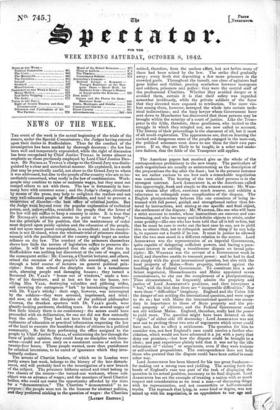NEWS OF THE WEEK.
THE event of the week is the actual beginning of the trials of the rioters, under the Special Commissions the Judges having entered
upon their duties in Staffordshire. Thus far the conduct of the investigation has been marked by thorough decorum : the law has been well and temperately expounded, while the right of discussion has been recognized by Chief Justice TINDAL in terms almost as
emphatic as those previously employed by Lord Chief Justice DENMAN. Sir Mem:etas TINDAL'S charge to the Grand Jury was distin
guished by a clear and untechnical manner. He explained, in a mode that may be practically useful, not alone to the Grand Jury to whom it was addressed, but also to the people of the country who are so im mediately concerned, what really is the law of combinations. Work people may combine to raise or maintain wages, but they must not compel others to act with them. The law is fortunately in har mony here with common sense ; and the Judge's charge, circulated by means of the press, may help to enlighten the restless and not very well-educated people of Staffordshire, and tend to prevent a recurrence of disorder—the best office of criminal justice. But the Judge went beyond even the popular explanation of technical points, and, uniawyerlike, reminded the people that the letter of'
the law will not suffice to keep a country in order. It is true that Sir NICNOLAS'S admonition seems to point at "more bishop " ; but the principle of his position, that the maintenance of order must depend upon public opinion and the education of the people, and not upon mere penal compulsion, is excellent ; and its enunciation is not ill-timed, when the wholesale trial of prisoners simultaneously with the pacification of the country might beget an undue reliance on dry law. The conduct of the prisoners themselves shows how little the terrors of legislation suffice to preserve discipline. It will be remembered that the origin of the riots in Staffordshire was nothing but discontent at the rate of wages, and the consequent strike : Mr. CoorEa, a Chartist lecturer, and others, seized1 the occasion of the people's idle assemblage, and went through a brief course of lectures on general political principles: from that school the disciples went in a tumultuous mob, alarming people and damaging houses ; they turned a Reverend Dr. Valdes " house out of windows," made a bon'fire of his furniture, and at last set fire to the house, terrifying Mrs. VALE, destroying valuables and pilfering trifles, and crowning the outrageous " lark " by intoxicating themselves with Dr. VALE'S whisky : their orgy, however, was interrupted by the soldiers—they were arrested, imprisoned, and tried : and now, at the trial, the disciples of the political philosopher CoorEa, the drunken sporters . with Dr. Vs_LE's goods, were ghastly-looking penitents, shedding tears. In the several stages of that little history there is no consistency : the actors could have proceeded with no deliberation, for one act did not flow rationally from the other. They had not been fitted by the commonest rudiments of education or practical information respecting the law of the land to execute the humblest duties of citizens in a political community. So far from performing the office assigned to the people by Chief Justice TINDAL, of maintaining the law through the force of public opinion, they could keep no discipline with themselves—could not even carry on a consistent course of action for twenty-four hours. Those people wanted, more than punishment for criminal intentions, to be cured of ignorance which they involuntarily endure. The arrests of Chartist leaders, of which we in London were Partly aware last week, belongs to the history of the late disturbances, and will probably lead to the investigation of a new branch of the subject. The prisoners hitherto seized and tried belong to two classes of the rioters—the turned-out workmen, whose sole object was an advance of wages ; and the members of local Chartist bodies, who could not resist the opportunity afforded by the riots for a "demonstration." The Chartists " demonstrated " to no Purpose : the people were not in the humour for abstract politics, and they preferred sticking to the question of wages : the Chartists
retired, therefore, from the useless effort, but not before many of them had been seized by the law. The strike died gradually away ; every fresh riot depositing a few more prisoners in the crowded gaols. Throughout the tumult, one class of agitators had gone hither and thither, passing scatheless between insurgents and soldiers, prisoners and police : they were the central staff of the professional Chartists. Whether they avoided danger or it avoided them, certain it is that their safety was regarded somewhat invidiously, while the private soldiers of the force that they directed were exposed to retribution. The more violent among them, however, betrayed the whole into certain technical indiscretions ; and the busy lawyer whom Government have sent down to Manchester has discovered that those persons may he brought within the scrutiny of a court of justice. Like the Trumpeter in the fable, therefore, these gentlemen, who incited to the struggle in which they mingled not, are now called to account. The history of their proceedings is the obscurest of all, but it most of all needs exploration. The appearances are, that on learning the excited and dangerous state of the people engaged in the turn-out, the political schemers went down to use them for their own purposes. If so, they are likely to be taught, in a sober and moderate fashion, that the fable of the Trumpeter still applies.


























